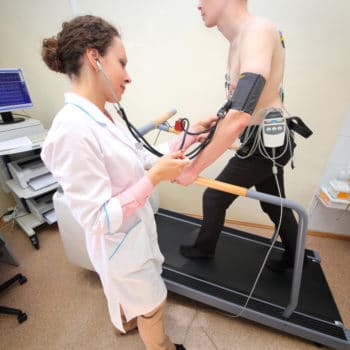Why We Love It
-
$56,100Potential Avg. Salary
-
22.1%Job Growth Rate
-
Growing DemandJob Outlook
-
Dependable Daily WorkloadCareer Attribute
An EKG technologist is a cardiac technologist with specialized training in equipment used to monitor and measure a patients heart beats. They attach electrodes to a patients body and record the electrical impulses transmitted by a patients heart.
Recommended Schools
What is an EKG Technologist?
The following responsibilities are common for EKG Technologists:
- Conducts EKG testing procedures on patients
- Places electrodes on the skin of the patient, placing them on the chest, legs and arms
- Conducts stress tests and monitoring on various patients
- Records and maintains all data and records of tests
- Provides physicians with data and test results
A Day In The Life
An EKG technician places heart monitoring electrodes onto a patients chest, arms and legs. After attaching these electrodes, they ensure that all the electrodes are attached to both the patient and equipment properly and via the machine will monitor the patients hearts electrical impulses and how they travel throughout the body. They also monitor the patients well-being and comforts them when necessary. Once the test is complete, which can take approximately 10 minutes, the technician must get the data and results to the patients physician promptly.
EKG technicians also conduct stress tests on various patients. They begin by explaining the procedure to the patient, discuss the patients medical history, connects the patient to the electrodes and EKG machine and then takes the patients vital records like, blood pressure, temperature and weight. Next, they turn on the treadmill at low speed, gradually increasing and instructing the patient to walk on the treadmill. While performing these tests they must record and document the data provided on the EKG machine. They then report this data to the attending physician.
Typical Work Schedule
This position is typically shift work due to the fact that patients are in need of medical professionals 24 hours a day 7 days a week. So this person must be available for a variety of shifts and working hours.
Projected job growth
As the baby boom generation continues to grow older and the population continues to battle disease, this career choice will continue to be in high demand and need.
Typical Employers
These individuals tend to work in hospitals, clinics, laboratories and other healthcare facilities.
Recommended Schools
How To Become an EKG Technologist
EKG technologists typically learn the majority of their job through on-the-job training, which will usually last anywhere from 4 to 6 weeks. Training for this position can take anywhere from 3 hours to 6 weeks, depending on the employers requirements. Stress testing and Holter monitoring can take longer, they involve a more in-depth study of cardiovascular anatomy and physiology. Most employers also require the candidate to have at least a year of certification training or a two-year Associate’s degree. Coursework should include classes in biology, anatomy & physiology, chemistry, medical terminology and cardiac monitoring. A student is required by the state they live in to earn and carry a certification. The certification is available through the Cardiovascular Credentialing program. Completing this program will earn the student the title of Certified Cardiac Technician or CCT. Certification requires at least 6 months of EKG recording experience.
In this career field, these techs will be in constant and direct contact with patients, doctors, nurses and other healthcare staff every day. Therefor, it is necessary for them to possess strong interpersonal skills. They must have the capacity to remain calm in stressful situations as well as adapting quickly and being able to follow instruction correctly. These individuals should also anticipate spending the majority of their time on their feet.
EKG Technologist Salary Data
We’ve provided you the following to learn more about this career. The salary and growth data on this page comes from recently published Bureau of Labor Statistics data while the recommendations and editorial content are based on our research.
National Anual Salary
Low Range
$37,670Average
$56,100High Range
$87,170National Hourly Wage
Low Range
$18/hrAverage
$27/hrHigh Range
$42/hrHow do EKG Technologist salaries stack up to other jobs across the country? Based on the latest jobs data nationwide, EKG Technologist's can make an average annual salary of $56,100, or $27 per hour. This makes it an Above Average Salary. On the lower end, they can make $37,670 or $18 per hour, perhaps when just starting out or based on the state you live in.
Salary Rankings And Facts
#314 Nationally for All Careers
Highest Education Among EKG Technologists
- 1.8% Doctorate
- 1.9% Masters
- 22% Bachelors
- 44.3% Associates
- 21.8% College
- 7.4% High School
- 0.7% Less than High School
Job Growth Projections and Forecast
2014 Total Jobs
52,0002024 Est. Jobs
63,500Job Growth Rate
22.1%Est. New Jobs
11,500How does EKG Technologist job growth stack up to other jobs across the country? By 2024, there will be a change of 11,500 jobs for a total of 63,500 people employed in the career nationwide. This is a 22.1% change in growth over the next ten years, giving the career a growth rate nationwide of Below Average.
Growth Rankings And Facts
#41 Nationally for All Careers
What Companies Employ The Most EKG Technologists
| Industry | Current Jobs | New Jobs Needed | % Increase |
|---|---|---|---|
| General medical and surgical hospitals; private | 35,000 | 6,200 | 6% |
| Offices of physicians | 7,300 | 2,600 | 3% |
| General medical and surgical hospitals; local | 3,600 | 300 | 0% |












